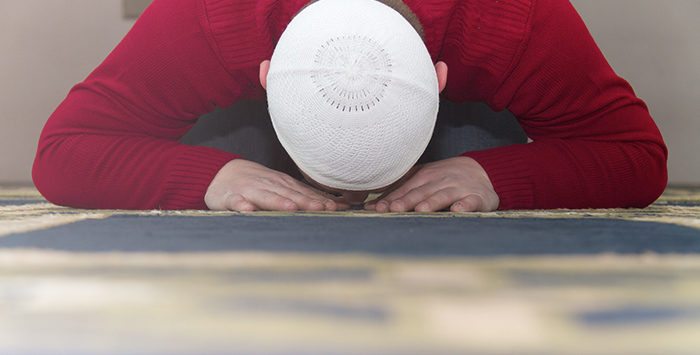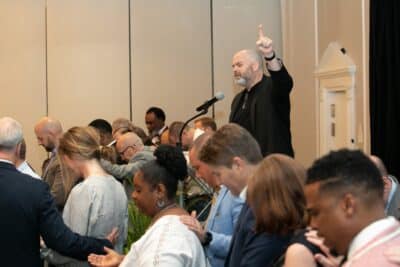Do Muslims and Christians worship the same God? This has become the focus of a national discussion following the controversy over this issue at Wheaton College. Wheaton last week suspended political science professor, Larycia Hawkins, after she donned a hijab, or Muslim headdress, to show solidarity with Muslims, and then posted the following on her Facebook page: “I stand in religious solidarity with Muslims because they, like me, a Christian, are people of the book. And as Pope Francis stated last week, we worship the same God.”
Today, the Chicago Tribune reported that talks between the college and Dr. Hawkins have reached a stalemate. Hawkins reportedly rejected an offer by the college that would revoke her tenure for two years, but would allow her to teach again in the fall.
 Some, like author and theologian Miroslav Volf, have supported Hawkins’ statement and alleged that her suspension was due to anti-Muslim bigotry. Yet, others are praising Wheaton College, saying the suspension was justified to protect sound theology. But few, if any, have the unique perspective that Nabeel Qureshi has.
Some, like author and theologian Miroslav Volf, have supported Hawkins’ statement and alleged that her suspension was due to anti-Muslim bigotry. Yet, others are praising Wheaton College, saying the suspension was justified to protect sound theology. But few, if any, have the unique perspective that Nabeel Qureshi has.
Qureshi grew up in a devout Muslim home, but converted to Christianity – a journey he details in the New York Times Best-Seller, Seeking Allah, Finding Jesus. Qureshi is an itinerant speaker with Ravi Zacharias International Ministries and is pursuing a doctorate in New Testament studies at Oxford University. A few days ago, I interviewed Qureshi form my new podcast to get his thoughts on the current controversy.
Julie Roys:
Many Christians and Muslims believe that they worship the same God. After all, Muslims acknowledge the Old Testament God of Abraham. Yet, they deny the Trinity and say Jesus was merely a prophet. What’s your perspective on this issue?
Your tax-deductible gift helps our journalists report the truth and hold Christian leaders and organizations accountable. Give a gift of $30 or more to The Roys Report this month, and you will receive a copy of “Hurt and Healed by the Church” by Ryan George. To donate, click here.
Nabeel Qureshi:
[pullquote]If you ask a Muslim, “Do you worship the Trinity?” they will say no. In fact, they will say that the Trinity is blasphemy.
[/pullquote]If you ask a Muslim, “Do you worship the Trinity?” they will say no. In fact, they will say that the Trinity is blasphemy.We worship a triune God, and I think the Trinity makes all the difference. We’re talking about a God who is a Father. The Bible says that over and over and over again that God is our Father. Now, we’re talking about a God who is love – 1 John 4. We’re talking about a God who’s willing to come into this world and, in fact, has come into this world many times both in theophanies in the Old Testament and then the incarnation in the New Testament.
None of these things is the Islamic god. He’s not willing to come into this world. He is not your father. Chapter five, verse 18, of the Quran makes that very clear – God is not the father – as does the whole chapter 112 of the Quran. And, he’s certainly not Triune. . .
In what way do we worship the same god? We see Islam doing this with many terms. For example, the term “Messiah.” It takes the term, and then it gives it a totally different semantic meaning, but it pretends as if it’s the same word.
That’s what’s happening with this concept of God. It’ll say that it’s the same God, but the semantic content behind the idea of the Islamic god is very different from the Christian, and in fact the Judeo-Christian view.
Julie Roys:
Do you believe that this actually does damage to our efforts to build bridges with Muslims, and to reach them with the gospel of Christ, to say that we worship the same god?
Nabeel Qureshi:
[pullquote]I think, that’s a form of western supremacy complex that our God is so good that other people must believe the same thing. No. It’s a western-centric view.Other people do not believe that.[/pullquote]Not necessarily. Here’s why: Muslims already believe that we worship the same god. Now, when a Christian says that Muslims worship the same god as Christians, I understand that to be a form of capitulation to Islamic theology, because that is what Islam teaches. . . . When Christians say “We worship the same God,” they are saying something that Muslims already agree with, so there is definitely bridge-building potential there, and so I understand why Christians would say it.But, I would ask them to be very careful. Because if we assume that Islam teaches that God is a Father, or if we assume that Islam teaches that God is love and that He loves people unconditionally, then we’re taking the beautiful things that are idiosyncratic to Christian theology. Just assuming that other religions believe them too, I think, that’s a form of western supremacy complex that our God is so good that other people must believe the same thing. No. It’s a western-centric view. Other people do not believe that. The Quran very specifically denies those things, so we shouldn’t assume that belief.
Get this episode and subscribe to the podcast on iTunes!
Julie Roys:
Beyond the theological issues, Christians are debating what’s appropriate when reaching out to Muslims. Actually, the Wheaton professor is not the first Christian to wear a hijab to show solidarity with Muslims. A Christian mother of two did the same thing this past spring. Do you think that these sorts of gestures are helpful or are they confusing?
Nabeel Qureshi:
I have zero problem with someone wearing a Hijab. In fact, I have zero problem with someone saying that they are supporting Muslims or showing solidarity with Muslims as long as they clarify that they do not agree with their theology. They’re not saying that their theology is correct when they support them. They’re supporting them as people who deserve rights, who should be loved, whose voices should be heard, who should not be persecuted.
In those ways, I support Muslims all the time and I try to make it clear. I mean, my parents are Muslims. My sister is a Muslim. All my cousins are Muslim. I love Muslim people, and so I want to show solidarity with them.
During the month of Ramadan for example, I oftentimes do fast to show solidarity with my Muslim friends, but only after I let them know I am not fasting out of submission to Islam, or even saying Islam is true. I’m fasting to join hands with you to let you know that I love you and care for you because that’s what my God has called me to do. As long as we clarify that we’re not submitting to a foreign theology and we’re not endorsing that theology, but we’re uplifting the people, I think it’s fine to show this kind of solidarity.
Julie Roys:
What about going and visiting Islamic centers or mosques as representatives. How much of that is helpful, and then how much maybe goes too far?
Nabeel Qureshi:
When we talk about going to a mosque or allowing Muslims to come to a church, I think the main concern that people have is a theological one of sacred space essentially and space that has been dedicated to perhaps someone other than God, spiritual forces other than God. Is that something that’s okay to do? Now, that’s something that I think everyone will have to make their own determination on.
[pullquote]I think it’s a good idea to build bridges, to build relationships and have conversations.[/pullquote]I personally see no problem with visiting mosques. I think it’s a good idea to build bridges, to build relationships and have conversations. So, I don’t think that that’s a problem, and I have no problem with Muslims coming to churches and having those kinds of conversations. Now, once again, I don’t think we should do anything that implies that we submit or agree with Islamic theology because that’s where it gets confusing. So, (it’s okay) as long as it’s clear that we have our beliefs, you have yours, but we love you as people . . . and we want to uphold your rights and we want to fight for your right to believe what you believe. The Bill of Rights is not just for Christians. It’s for everyone. As long as we stand up for people, while not necessarily confusing them as if we’re standing up for their beliefs, that’s perfectly fine in my opinion.Julie Roys:
I would guess that you draw the line in actually joining in with any prayers or religious activities, because I’ve known of groups that have done that, even school groups that have done that. That would be a bridge too far, wouldn’t it?
Nabeel Qureshi:
It depends. For example, I invite Muslims to pray with me all the time. I will say that, “I’m about to pray. Would you like to join with me?” If they say yes, then I pray.
Now, what you don’t want to do, though, and I have seen some Christians doing this, is going to a mosque and pray one of the five Daily Prayers with Muslims. They just didn’t know what they were doing, so they were told “Stand here. Say these words,” and they did it. Doing that is essentially symbolic of being a Muslim. No one but Muslims pray those five Daily Prayers, and the words that are in those prayers are words of submission to Allah, to Muḥammad as his wise prophet. That is definitely a bridge too far.
Basic standing together and asking God, invoking the Father, that’s perfectly fine, and I highly suggest you do that. Actually, I do suggest Christians start discipling Muslims while they’re still Muslim. There’s nothing un-Christian about that.
In part two of this interview, Qureshi discusses whether Islam is a religion of peace and why now is a watershed moment for reaching Muslims with the gospel. Listen to the full interview with Nabeel Qureshi in Episode One of the podcast, Seeking Truth with Julie Roys, or read the full transcript of the interview.
Programming Update
On Saturday, January 16, Nabeel Qureshi will debate Miroslav Volf, a key proponent of the view that Muslims and Christians worship the same God. The debate will air on Up For Debate, a live program on Moody Radio featuring host Julie Roys.




















One Response
Perhaps We should compare the God as given in Old Testament, New Testament & Quran.
The God of Old Testament is not the same as the God of New Testament. The God of N.T is made up of Trinity, which is strictly against the singular God of Old Testament & Koran. Besides, O.T & Koran states Holy Spirit is the Angel Gabriel while N.T states that Holy Spirit is part of the Trinity God. And, don’t forget that the concept of “God coming in Human Flesh” is a uniquely Christian concept which comes right out of Ancient Baal Worship & a common theme of all pagan religions, ancient & modern. Reading about Hinduism, a pagan religion, where the concept of Triune God & “God coming in Human Flesh” has existed since long before the onset of Christianity. And with all the Idol worship (revering) of Jesus & even Mary in Christianity, it’s time we realize that Christian God is more similar to Pagan God than Abrahamic God.